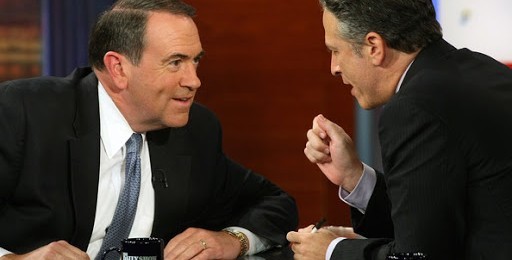
On a recent episode of the Daily Show, Jon Stewart debated Mike Huckabee on the issue of legalized homosexual marriage-an oxymoron if ever there was one. (Click HERE to watch video.)
What is truly astonishing is that Jon Stewart’s debate performance has been widely lauded by homosexuals and their supporters as “brilliant” and “erudite”-a virtual intellectual sucker-punch to the ignorant masses whose views Huckabee represented.
I guess if one measures brilliance and erudition by an applause meter or by the number of words Stewart spoke as contrasted with the number Huckabee spoke, Stewart was brilliant and erudite. Let’s remember, though, that his audience is primarily NY liberals-hence the perfervid applause-and that talk show hosts always monopolize the conversation.
On the other hand, if one measures erudition by evidence of scholarship, it’s difficult from this brief debate to determine whether Stewart has studied any serious historians, political scientists, law professors, or theologians on this issue.
And if one measures brilliance by the quality of evidence provided for an argument, or its originality, or its soundness, it’s difficult to see why Stewart’s arguments were deemed “brilliant.”
Here are a few of the arguments whose brilliance evidently blinded Stewart’s viewers to their unsoundness:
Unsound Argument A:
Premise 1. Laws banning interracial marriage were wrong.
Premise 2. Homosexuality is by nature the same as race.
Premise 3. Therefore, laws banning homosexual marriage are wrong.
False premise:
Homosexuality is the same as race: Homosexuality is ontologically different from race. Race is biologically determined and entails no behavioral implications whatsoever, and therefore is not amenable to moral assessment. There is no research proving that homosexual impulses are biologically determined, and no matter what causes homosexual impulses, attractions, or thoughts, homosexual conduct is volitional and therefore amenable to moral judgment. Many behaviors that may be shaped to some degree by biological factors are immoral. It is both erroneous and dangerous to suggest that the presence of biological influences renders behaviors automatically moral.
Unsound Argument B:
Premise 1. Access to civil marriage is an unconditional civil right.
Premise 2. All adults are entitled to all civil rights.
Premise 3. Homosexuals are prohibited from accessing civil marriage.
Conclusion 4. Therefore homosexuals are being unjustly denied their civil rights.
False premises:
Access to civil marriage is a civil right: Marriage or access to marriage is not a civil right. And civil marriage is an institution the joining of which should be limited by those criteria central to its nature. In other words, marriage pre-exists the state. It has a particular objective nature. The state’s task is to ascertain which criteria are central to marriage and then protect and preserve those criteria.
Access to civil marriage is unconditional: Access to marriage is conditional upon meeting a number of criteria including being the opposite sex of one’s partner.
Homosexuals are prohibited from accessing civil marriage: All adults may get marry as long as they fulfill the criteria that society has deemed essential to marriage, which pertain to number of partners, minimum age, consanguinity (i.e., blood kinship), and sexual complementarity.
Polyamorists are prohibited from changing the criterion related to number of partners. Pedophiles are prohibited from changing the criterion related to minimum age. Incestuous couples are prohibited from changing the criterion related to consanguinity. And homosexuals are prohibited from changing the criterion related to sexual complementarity.
Unsound Argument C:
Premise 1. Concepts or views of marriage are always changing. (Implied)
Premise 2. Change is always good.
Conclusion: Therefore, changing the legal definition of marriage to include homosexuals is good.
False premises:
Concepts or views of marriage are always changing: There is remarkable stability throughout recorded history on the complementary nature of marriage even in societies that allowed polygamy.
Change is always good: Sometimes change is foolish, evil, and destructive.
Unsound Argument D:
Premise 1. The government’s sole or central interest in and involvement with marriage is to support romantic love between people.
Premise 2. Homosexual partners experience romantic love.
Conclusion: Therefore, the government should permit homosexual couples to marry.
False Premises:
The government is centrally concerned with supporting love: The government is not centrally concerned with love. It is centrally concerned with supporting the type of relationship into which children may be born and which best serves the needs of children, because this type of relationship best serves the good of society.
Invalid Argument:
Therefore, the government should permit homosexual couples to marry: Even if it were true that the government’s sole reason for involving itself in marriage were to support romantic love between people, and even if it were true that homosexual couples experience romantic love, it does not automatically follow that the government should permit homosexual couples to marry. Even a government that is centrally concerned with supporting romantic love-which ours is not-need not sanction all relationships whose partners experience romantic love.






























